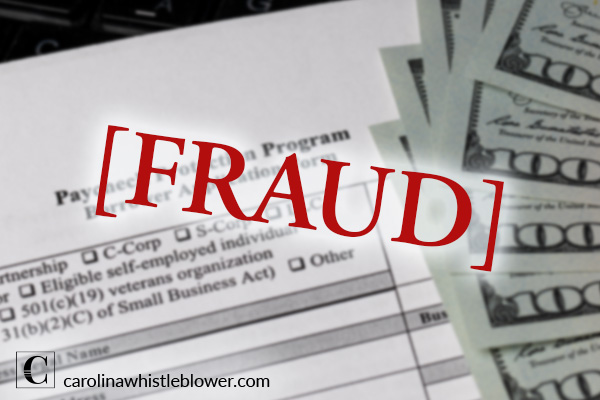In the wake of the 2020 pandemic, the federal government established the Paycheck Protection Program (PPP) to provide financial relief to struggling businesses. The PPP program was part of the broader Coronavirus Aid, Relief, and Economic Security (CARES) Act. Intended to keep employees on companies’ payrolls, the program distributed billions of dollars in forgivable loans to businesses throughout the United States.

Unfortunately, federal programs with significant dollars at stake bring out the fraudsters, and the PPP program quickly became a target for significant fraud. A 2023 report by the U.S. Pandemic Response Accountability Committee (PRAC) reported a potential $5.4 billion in pandemic aid fraud, including PPP fraud.
What is PPP loan fraud under the FCA?
PPP fraud under the False Claims Act (FCA) generally involves a business making false statements to the government to obtain PPP funds. The FCA is a federal law that imposes liability on those who knowingly submit false or fraudulent claims for payment to the government. It is a powerful tool that allows private citizens to sue on behalf of the government when they believe an individual or company has committed fraud against federal programs.
Examples of PPP fraud under the FCA:
- Claiming higher payroll expenses than what is accurate to qualify for a larger loan
- Misrepresenting the number of employees or their status to meet loan eligibility requirements or to qualify for a larger loan
- Using distributed PPP funds for unauthorized purposes, such as a CEO’s personal expenses, instead of payroll
- Falsely claiming that the loan was necessary for business operations or falsely claiming compliance with program requirements
Contact us online or call 1-888-292-8852 now for a free, confidential conversation if you suspect that an individual or company has committed PPP loan fraud.
What can you do if you believe an individual or company committed PPP fraud?
If you believe an individual or company committed PPP loan fraud, there are several steps you can take to pursue an FCA claim and potentially receive a significant reward:
- Talk to an attorney confidentially: Before taking any other action, consult with an experienced whistleblower attorney for a free, confidential conversation about your concerns. A whistleblower attorney can help you understand what you’re seeing, your rights, the legal process, and the potential risks and rewards involved in reporting the fraud.
- Gather evidence: Under guidance from your attorney, collect any relevant documents, emails, financial records, or communications that support your suspicion of fraud. The law provides protections against retaliation for whistleblowers investigating if their suspicions of fraud against the government are true.
- File a qui tam lawsuit: With the help of an attorney experienced in whistleblower cases, you can file a qui tam lawsuit under the FCA. This lawsuit is filed anonymously or “under seal” while the government investigates.
- Protect your rights: The law prohibits retaliation against whistleblowers. If you experience retaliation after reporting the fraud, you may be entitled to significant compensation. Keep records of any adverse actions taken against you after you report fraud so your attorney can help you pursue a retaliation case.
What are the benefits to an FCA whistleblower for reporting PPP fraud?
Under the FCA’s qui tam provisions, you can file a lawsuit on behalf of the government to recover funds taken fraudulently through the PPP program. In a successful case, you may be entitled to up to 30% of the recovery.
Some recent whistleblower rewards for PPP fraud cases under the FCA include3:
- Whistleblower awarded $1.62 million in False Claims Act case relating to PPP fraud – Victory Automotive Group settled with the Department of Justice for $9 million for allegedly providing false information in support of its PPP loan forgiveness application
- Whistleblower awarded $1 million in False Claims Act case relating to PPP fraud – Empire Roofing agreed to pay $9 million to resolve claims that it falsely certified its affiliate businesses were eligible to receive PPP loans
- Whistleblower awarded $700,000 in False Claims Act case relating to PPP fraud – Multiple private country clubs paid more than $5.8 million after allegedly submitting fraudulent loan applications
Legal protections for whistleblowers under the FCA
Whistleblowers are sometimes reluctant to come forward with suspicions of PPP fraud. But protections exist under the FCA to help potential whistleblowers feel comfortable pursuing an FCA claim.
The FCA’s whistleblower protections include:
- Protection from retaliation: This includes protection from being fired, demoted, harassed, or discriminated against because of your involvement in investigating, filing, or participating in an FCA claim. If you face retaliation, you may be entitled to:
- Job reinstatement
- Double back pay
- Litigation costs and attorney’s fees
- Protection of whistleblower identity: The FCA allows whistleblowers to file their lawsuits under seal, which means your identity is kept confidential while the government investigates the claim.
How Carolina Whistleblower Attorneys can help if you suspect PPP fraud
Our mission is to eliminate corporate misconduct while supporting those brave enough to step forward, and our team’s results demonstrate our success and commitment to justice.1,4
We are so committed to fighting PPP fraud under the FCA that we operate on a contingency fee basis. This means we cover the costs of building your case as we work together to try to reclaim stolen taxpayer funds. If we’re unable to secure an award for you, you owe us nothing – Guaranteed.2 And our You-First Policy means we put your needs first in every decision we make on your case.
Suspect PPP loan fraud? Let’s have a confidential chat where we can answer your questions and help you make the right decision for you. The conversation is free and there is no obligation.
Contact us online or call 1-888-292-8852 today!
Similar Articles
Government Fraud | July 28, 2023
What if the Government Decides Not to Pursue Your Whistleblower Case?
When a whistleblower files a qui tam lawsuit alleging fraud against the government, the Department...
Government Fraud | February 03, 2020
Whistleblowers Help Department of Justice Recover $3 Billion of Taxpayers’ Money in 2019
The general public may tend to think of the act of whistleblowing as a...
Government Fraud | November 09, 2019
NC Wife-Hiring Conspiracy Exposed: Former State Employee Who Blew Whistle on Two Disgraced NC District Attorneys Awarded $1.8 Million by Jury
While state prosecutors have broad authority and enjoy vast administrative discretion, they are not...
Contact the Carolina
Whistleblower Attorneys
If you’re wondering if it’s a good idea to speak with a whistleblower lawyer about what you know, let us set the record straight.
- Corporate ethics hotlines can be risky and may lead to termination. If you’ve already done this, call us immediately.
- Your coworkers could be aware of the fraud – or complicit in it – and you should not talk to them about it.
- The first claim to be filed under the False Claims Act can proceed – if you’re not first, you’re at a serious disadvantage and may get nothing (another reason not to speak to your coworkers about it).
- A confidential discussion costs you a few minutes, but could save you time, stress, and money.
"*" indicates required fields
